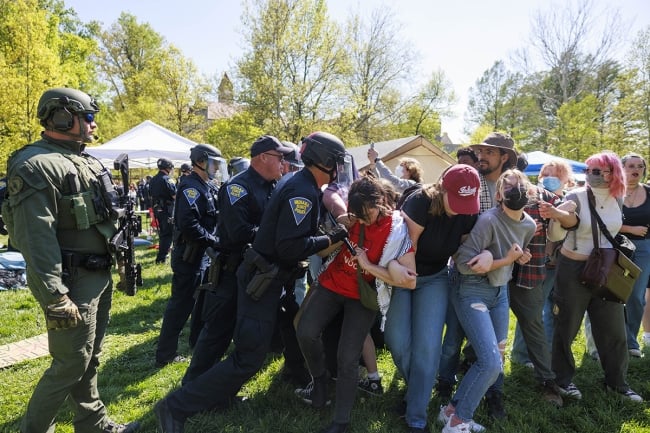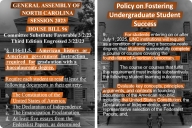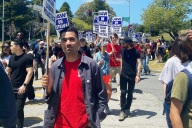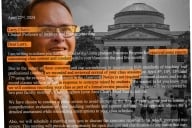You have /5 articles left.
Sign up for a free account or log in.

Police broke up a pro-Palestinian protest on Indiana University at Bloomington’s campus Thursday. It’s part of a trend that now includes faculty member arrests.
Jeremy Hogan/SOPA Images/LightRocket via Getty Images
Amid recent crackdowns on pro-Palestinian encampments by campus police and outside law enforcement agencies, a new spectacle went viral online: faculty members being zip-tied and arrested.
A CNN video showed the bedlam Thursday as campus police and other law enforcement agency officers cleared the encampment on Emory University’s Atlanta campus. An orange tent falls over as four officers, in black and light blue uniforms, force someone in a keffiyeh to the ground. An unmasked woman with a handbag approaches the officers atop the protester.
“What are you doing? What are you doing? What are you doing?” she says, before squatting behind one of the officers. A campus police officer immediately grabs her, shouting “Ma’am!”
He repeatedly orders her to “Get on the ground!” as he grasps her arms, but she doesn’t immediately comply. “Let go of me!” she says. “Get on the ground, I said!” he says, pushing her to the ground.
“Oh my god! Oh my god!” she says while being held face down, her body in the grass, her head on the pavement and her glasses on the ground nearby.
Another officer joins in and appears to push her head into the pavement as he yanks her other arm behind her back. “My head!” she says, and then, “Just hit my head on the concrete!” As they zip-tie her wrists, she says “I am a professor! I am a professor of economics!”
She tells them her name: She’s Caroline Fohlin, an Emory economics professor and the wife of the dean of undergraduate admissions. The camera moves on to another protester who is crying while being arrested, as the video ends.
In another video shared on X of an officer escorting Fohlin away, she says she “impulsively hit him on the head very lightly to get his attention, and they grabbed me, threw me to the ground and arrested me.” Fohlin was charged with simple battery against a law enforcement officer. Gregory Clement, her attorney, said he couldn’t confirm whether the second video was unedited and didn’t say whether or not she touched an officer.
“Caroline Fohlin was not a protester at Emory on April 25,” he said in an email to Inside Higher Ed. “She emerged from her office, concerned only about the treatment of students on the quad.”
Clement said his client was “in the DeKalb County jail for just under 27 hours.” Fohlin didn’t respond to Inside Higher Ed’s emailed requests for comment Friday and over the weekend.
Since April 18, when Columbia University called in the New York Police Department to clear a pro-Palestinian encampment, scenes of police breaking up pro-Palestinian campus encampments and sometimes tussling with protesters have dominated television and social media news feeds. Protesters have responded to the police actions with more rallies and renewed attempts to set up encampments.
Last week, a new trend appeared to emerge, when about 20 New York University faculty members were arrested and charged with trespassing, according to the president of the NYU American Association of University Professors (AAUP) chapter, after university officials called in the New York Police Department to clear an encampment and faculty members tried to form a protective cordon around students. On Thursday, three faculty members were arrested at Emory and another three were arrested at Indiana University at Bloomington. According to four of the arrested faculty members, they were sticking up for protesters as police were clearing the encampments.
“These protests aren’t being organized by faculty,” said Isaac Kamola, director of the Center for the Defense of Academic Freedom at the AAUP. He said students’ organizing capacity “vastly outstrips” that of faculty members, and students are “way more courageous than the faculty have been.”
“I think faculty are realizing that the students on this issue are in the right and deserve to be protected and supported,” Kamola said, adding that when faculty members see “our students being arrested by police, there’s an instinct among many faculty to defend our students.”
At Emory, philosophy department chair Noëlle McAfee was also detained Thursday, another viral video shows.
“Can you call the philosophy department office and tell them I’ve been arrested?” she says to someone recording her as she’s led away by an officer in a black balaclava with an “Atlanta Police” vest. “I’m president-elect of the University Senate,” she says.
McAfee told Inside Higher Ed she’s also on the executive committee of Emory’s AAUP chapter.
“They kind of arrested a couple of the wrong people,” she joked.
She said she’d been gearing up for an external review of her department for the past year, and Thursday was a “big day” with the reviewers on campus. McAfee had just taken the reviewers to campus and gotten them settled in when, she said, she went down to the university’s quad to ensure that Emory hadn’t again called in the Atlanta Police—as they had during a protest last April against the proposed Atlanta Public Safety Training Center, which opponents call “Cop City.”
Not only were Atlanta Police there, Georgia State Patrol officers were also on hand. McAfee said the moment the state troopers got in place, “suddenly out of nowhere all the police rush in and start beating up students.” She said she saw officers being “extremely aggressive” with a student, pulling her in different directions and “it seemed like they were hitting her.”
McAfee began videotaping. “I’m standing back and then I’m yelling at them ‘Stop, stop!’” When an Atlanta Police officer told her to step back, she said she refused and was arrested. She said she was taken to jail, released and charged with disorderly conduct.
Emil’ Keme, an Emory professor of English and Indigenous studies, said he got to campus and saw the encampment and a couple of his students and colleagues there and went to say hello and show them support. Keme said he decided to stay when he heard police were coming.
He said he saw Fohlin being arrested and he ended up locking arms amid tear gas (the Georgia State Patrol said it used “pepper balls,” not gas) with a student and an older woman next to him. He said he wanted “to protect the students and just be there for them as a faculty member.”
He said he ended up zip-tied, arrested and briefly jailed.
At Indiana University at Bloomington, Barbara Dennis, a professor in the School of Education, told Inside Higher Ed that she and two other faculty members were arrested Thursday and transported on Indiana University buses to the county jail. Dennis said she spent about six hours there.
Her alleged crime? Dennis said she and the other arrested faculty members stood in the way of riot-gear equipped Indiana State Police to protect student demonstrators.
“The particular state police officer that was in front of me was body bashing me to back me up because I wouldn’t step back,” Dennis said. “… I kept saying ‘Don’t touch me, stop, you’re hurting me.’” Another state trooper pushed her to the ground and zip-tied her hands, she said. One student detained alongside her received bruises from a baton, and another had a bleeding lump on her head, Dennis said.
Dennis said she was charged with misdemeanor trespassing. While the university banned other arrestees from stepping foot on campus for a year, she said her paperwork seemed to have an error: The ban was from April 2024, through April 2024, not 2025. “I was back on the protest site today,” she said Friday.
Steve Tamari, a professor of Middle East and Islamic history at Southern Illinois University Edwardsville, was detained Saturday after being arrested on the campus of Washington University in St. Louis, while police cleared an encampment there. An Instagram video shows he was close behind officers when they were arresting others, and he was recording them with his phone, when one cop lunged toward his cell. Tamari dodged, but five officers ended up grabbing him and forcing him to the ground.
Tamari said he spent hours in jail, where he met Jill Stein, the Green Party presidential candidate, who was arrested during the same protest. He said he ended up being released around 2 a.m. Sunday without any charges. The university said 100 people were arrested.
“I just thought it was my responsibility as a professor to protect students,” Tamari said. He said his students from Southern Illinois University were part of the demonstration, and he’s “grown very close to these students,” many of whom are foreign. “They’re risking a lot,” he said.
“This is like the opposite of what a university should be,” Tamari said. He said, “universities are on the front lines of squashing debate and academic freedom.”
Faculty Members Defend Their Colleagues
Now other faculty members are denouncing these universities for the arrests of their colleagues. The day after the arrests at Emory, faculty members in the College of Arts and Sciences, the institution’s main undergraduate college, held an emergency meeting, said Tom Rogers, a history professor who leads Emory’s AAUP chapter. Rogers said a proposal to censure university president Gregory L. Fenves was originally proposed, but the faculty members who filled a 180-seat auditorium, upgraded the censure resolution to a no-confidence statement that will be voted on this week.
“There’s a lot of anger at the administration for what took place yesterday,” Rogers said Friday. McAfee, the University Senate president-elect, said “overall the faculty are appalled by this.”
Keme, the Emory faculty member arrested after locking arms with others, said he’s “outraged” about how faculty members were “humiliated” and “treated as criminals” in a “place of knowledge.”
The proposed no-confidence resolution says “the events of April 25, 2024, are unprecedented in the history of Emory College and University,” and says “there was no evidence of violence on the part of protesters, and no disruption of teaching and research activities.” It says “what was disruptive—profoundly so—was the conduct of the university administration that violated multiple college and university policies and is an affront to everything Emory stands for.”
The resolution also calls on the university to drop all charges and pay all legal fees for those arrested.
Emory administrators declined interview requests and only responded to one written question. A spokesperson pointed to a statement from Cheryl Elliott, the university’s vice president for public safety, in which Elliott said the encampment was in a staging area for commencement (the main ceremony is May 13 on the quad) and that “objects were thrown at police officers” while they tried to disperse the crowd and arrest people.
Fenves said in a statement Friday, “I am saddened by what took place at Emory yesterday. To watch these highly organized, outside protesters arrive on campus in vans, construct an encampment and overtake the quad just days after it was vandalized with hateful and threatening messages was deeply disturbing.”
He said “the fact that members of our community were arrested upsets me even more” and “we are working with law enforcement agencies to assist detained community members and expedite their release.” He said the university “will not tolerate vandalism, violence or any attempt to disrupt our campus through the construction of encampments.”
McAfee noted that most people arrested were actually associated with Emory, not “outside protesters.” And she mocked Emory administrators for mentioning commencement ceremonies to justify crackdowns.
Indiana University at Bloomington faculty members already voted no confidence in their president and provost earlier this month following multiple academic freedom controversies. On Thursday, administrators released a statement defending the university’s response to the encampment.
“Participants were told repeatedly that they were free to stay and protest, but that any tent would need to be dismantled,” they wrote. “Given the expectation of a high number of external participants, Indiana State Police was brought in as a law enforcement partner. Once prohibited structures were removed, the protests continued peacefully.”
An Indiana University spokesperson confirmed in an email that three faculty members were among 34 people, mostly students, arrested Thursday. The spokesperson said they all received one-year bans from campus but that the university encouraged them to appeal the bans. “Trespass ban notices will be suspended during the appeals process in nearly all cases," the spokesperson wrote. "This will allow these students and faculty to complete the semester.”
In a statement Friday, the executive committee of the university’s AAUP chapter called the administration’s “police action” against the encampment “an egregious violation of Indiana University values and the academic freedom principles the administration purports to honor.”
“We call on the administration to immediately reverse all university sanctions on those arrested and to request that all criminal charges be summarily dismissed,” the statement said. “We also call on the Indiana University Board of Trustees to authorize a thorough and independent investigation of the decision-making processes that led to Thursday’s outcome.”
As for Washington University at St. Louis, its chancellor, Andrew D. Martin, said in a statement Monday that the Saturday protest was threatening, and most of the protesters weren’t Washington University students, faculty or staff members, and some “were attempting to break into locked buildings or to deface property.”
He further said “there were chants that many in our community find threatening and antisemitic” and “when the group initially set up in front of Olin Library, our police dispatch received numerous calls from students who were inside the library, terrified that they were in harm’s way.”
The national AAUP released a statement Monday saying “policies guaranteeing academic freedom and free speech mean nothing if they are not upheld in times of stress,” and calling on university leaders “to drop charges against peaceful protesters” and “keep armed law enforcement off campuses.”
Kamola, of the AAUP, said “it’s one thing to see university presidents fail to defend academic freedom” in front of Congress, and it’s “quite harrowing to see that cowardice followed up by the sanctioning of police violence on campus.”
He said faculty members and students are “losing faith in their institutions and the leadership of those institutions … the furthest thing from academic freedom is calling in the police.”
McAfee, the Emory philosophy department chair, said “right now, it seems that the administrations have the power to arrest and punish people, the speech they don’t like, but the faculty kind of have the relationships with the students and the educational mission and they are the conscience of the university.”
She said faculty members can model the moral high ground.
“The real power is the power of public opinion and these administrations are losing that, they’re losing their legitimacy,” she said.








